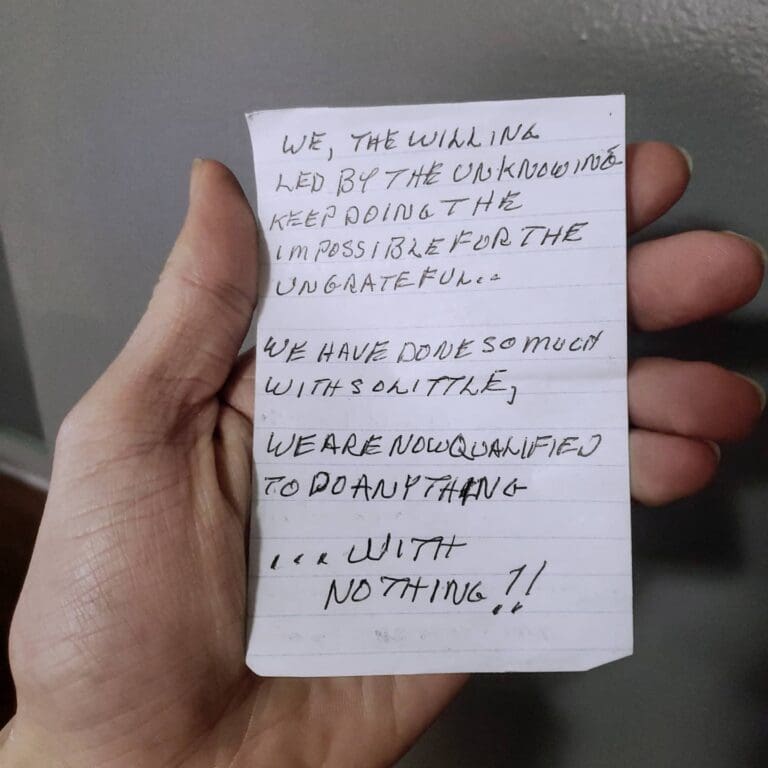Image Credits: Photo by Mike Petrucci on Unsplash.
Retail in Retrospect
Of the various service based industries I have worked during my developing career, retail has been the longest. I started at the bottom, stocking shelves at 5:00 am every morning, six days a week. In the course of 5 years, I promoted up to part time sales, full time grocery specialist, then promoted twice as an assistant department manager.
In retrospect, I could have promoted faster if I placed growth in the company as a higher priority. Then again, taking my time allowed me to develop my leadership, salesmanship, and project management more fully. My interactions with my team were more present in the moment and therefore, more genuine.
Retail does garner a negative impression for many given the demands of the job. The sheer amount of physical labor alone can wear out most, myself included. Tack on the administrative and logistical demands that are imposed on the managers at all levels and the job becomes incredibly taxing for low compensation.
That said, the job while difficult has been enlightening in other areas. In the 5 years I have worked in retail I have learned a great deal from my colleagues. The fundamental skills required to succeed in retail do translate to any career you may pursue in the future. Keeping to the most valuable, here are the 5 skills I developed when I worked in retail.
Salesmanship
As you would expect, salesmanship is the bread and butter of retail.
For those who do not practice selling in their day to day work life the process can seem daunting. As a seller, you must radiate the confidence and understanding of your product/service while you simultaneously navigate the prospect towards a purchase. Furthermore, sales personnel are haunted by the horror stories of sleazy salesman who are willing to egregiously lie to close a sale.
For the most part, this is fairly easy to navigate by reducing the concept of sales into a repeatable system. This system is built on one key element which is problem solving. Your prospect is coming to you with a pain they need alleviated. Through a series of questions you can identify where their pain is at and how to best address it with what products/services you have available.
This process can be broken down into the following steps –
- Initial contact and rapport building
- Identifying the needs of the Prospect
- Presenting a menu of options
- Handling objection and closing the sale
- Subsequent follow ups.
Repeating this process promotes social growth within a person. Firstly, confidence will increase as the system becomes more familiar to the sales personnel. They will learn to anticipate concerns and address them before they come to the prospect’s mind. With this clarity, the prospect will feel empowered by the salesman/woman’s confidence. In turn, this will bolster the emotional pride the prospect attributes to their purchase. When performed successfully, the prospect is highly likely to return to re-experience that core emotion.
Practically speaking, salesmanship can be applied in any form of negotiation. Whether you are “selling” the idea of getting pizza over burgers for dinner, proselytizing a theology, or campaigning in politics – you are engaging in a form of sales. Therefore, building that skill can help you better deliver on the benefits of ideas, services, and products you can offer others. Alternatively, you will also better recognize when you are being “sold to”.
Leadership
Leadership is yet another daunting element I have had to hone in retail. While overseeing the sales growth of my department was a core duty, systematizing the day to day tasks within the department was just as crucial.
Given that retail is an entry level workforce, many managers will quickly be able to identify who is reliable and who just shows up for a paycheck. The unfortunate result of this is that the reliable team members end up carrying the burden of the most work. The burnout that ensues contributes to the disdain for working in retail.
I can see both sides of the coin because I have been on both sides. I have been the guy who worked miracles for his boss. Likewise, I have been the boss who has had so much on his plate, I designated tasks to people I knew would get things done quickly and correctly the first time. Oftentimes, it is an unwinnable situation. In the desperate attempt to achieve sales goals determined by a round table of corporate overlords, the sales team is hard pressed accomplish the unfeasible.
So how do you lead a team in this kind of scenario?
Everyone’s style of leadership varies according to their values. Task oriented people will refine the daily routines and systems to be as efficient as possible. The experimental types will make major changes to see what works and what doesn’t. Personally, I leaned towards building a team of specialists.
Whenever my team would approach me for insight or instructions, I would turn the tables onto them and ask them how would they approach their challenge. I do this because most of the time, I know their question is an easy fix. And giving them the answer immediately will not stop them from asking the same question two weeks from now. By using their uncertainty to both validate their opinion and to build their confidence in solving low tier problems without asking a manager, I can focus on the more difficult tasks.
Is this fool proof? Absolutely not. Some people just want to be told what to do so they can get on with their day. Others are deathly afraid of doing something that in their minds may get them “in trouble” for not asking. And some people are just completely unclear about what is required of them.
At the end of the day, leadership styles varies as much as personal expression. It boils down to recognizing the behavioral patterns within your team and finding ways to build on their weaknesses and challenge their strengths.
Team Member Development
Team member development goes hand in hand with leadership. Recognizing as a manager that you have a team of individuals with different goals, backgrounds and means of creative expression is the first step to building a team of people rather than a team of units.
While achieving harmony is a key goal as a leader, addressing discord is a daily part of our agenda.
I have engaged team members in varying depths of philosophical debate and shared countless laughs in the process. I counselled team members through anxiety attacks and emotional breakdowns. On occasion, I have mediated conflict between two people.
It got to the point where my team members referred to me as the “Dr. Phil ” of the department… and for good reason too. Team members are almost guaranteed to burn out and quit if they work in a constant state of negative emotion. Some people just need to talk out their frustrations and others want a clear tangible solution to a problem. The burden of management requires you to have both on the ready, though we often come short due to circumstance. I mitigated this gap by focusing on building rapport. With rapport, I can then offer a solution that they will be inclined to see through.
The first few months in both departments that I have managed was dedicated to building rapport with my team. With my knowledge in personality typing and psychological models, I could classify my team members according to what they needed from me as a leader. As I would learn more about them I could build a mental road map to boost their weaker skills without causing them to feel embarrassed or ashamed. Most of these included confidence boosting exercises, helping them process their emotions, and leading by example.
In doing so, I was able to bolster the efficiency of the team, especially in regards to large projects.
Project Management
Project management was a skill I had to learn on the fly during my store’s interior remodel. Not only were my peers and I expected to maintain the sales growth of the department but on top of that we had to follow a fairly stringent remodel schedule for 6 months.
At our level, the instructions and tasks were fairly clear. Everything we needed was laid out for us, we just had to do the grunt work. What no one expected though was COVID-19.
I predicted, like most people, that COVID-19 would result in a massive reduction of in store traffic. I was completely wrong.
The result was easily the biggest challenge of the year for all of us managers. For some of us, our entire careers. Not only was there an influx of in store traffic despite the state lock down, we had a half finished remodel to wrap up. The general tension due to the lockdown and COVID-19 led to more agitated customers and team morale was constantly in flux.
Having said that, as a manager there were things that needed to get done. The onus was on us to lead the team there. In my case, having a team of specialists helped us wrap up our remodel. I could easily assign tasks to team members who were both knowledgeable and good at what they did. I would personally thank them every night for their efforts and did what I could to keep the atmosphere as lighthearted as I could.
No good manager operates on just jokes and delegation though. Getting elbows deep in the remodel process involved doing the jobs no one wanted to do. At times I was required to come in at 5am to adjust fixtures and I was actively involved in the most grueling physical work. Some days were so exhausting, I would jokingly tell a part timer,
“You get to be in charge today… I am pooped.”
My team was fully aware of the effort their managers put in. We were by no means perfect but seeing how hard our team was working on this project, motivated us to continue to give everyday 110%. The team feeds off the energy of their leaders.
Looking back, my team was able to complete a major store remodel project while maintaining guest relationships… in the middle of a global crisis. I don’t think I can find the words to express how proud I am of them.
Customer Relationships
Customer relationships is easily the most disliked element of retail. Anyone I have met who has formerly worked in retail has cited the customers as the part of the job that led them to quit. For many retailers, especially those who work in busy stores, we find ourselves directly assisting hundreds of people daily. Furthermore, a single bad experience with a customer can sour a team member’s mood for the rest of the day, sometimes even the week.
And I can’t blame them.
Regardless of generation, background, and status, there is a large fraction of shoppers who bring their emotional frustrations to the store and vent them out on employees. For many of these frustrated people, anything can be perceived as an emotional trigger. Some are even unconsciously looking for a reason to be upset.
For the most part my former retail colleagues are adept at addressing the emotional outbursts of customers. As a manager, seeing a team member be verbally attacked immediately requires me to redirect that anger towards myself. I have dealt with more angry customers than I can count and I have found the following process to work well for me.
- Identify whether their frustrations are based on a product they purchased, the end result of a project they are trying to complete, or an external matter that is non-store related.
- This is done by observing the nature of their complaints. If a product has failed to meet their expectations than following a warranty procedure usually solves their problem and their anger will subside. For the customers who botched their projects with a lack of knowledge, assume responsibility for their errors, walk them through step by step how to complete their project properly, and use any warranty procedures to mitigate their costs. In the event their frustrations are non-store related, there is very little you can do.
- Maintain a stoic and calm persona throughout. Physics has taught us that polarizing energies neutralize each other. Therefore, matching a customer’s anger with your own anger will only amplify the tension in the conflict. If the anger cannot be addressed with the process above and if the customer is being antagonistic, find a way to escort the customer out of the store. Do not fight fire with fire. I have seen plenty of team members who have lost their jobs even when they were morally justified.
- By maintaining a stoic persona, you are asserting dominance and control. While their minds are racing for ways to provoke you, you will be able to guide them like a leaf in a river. Below is a video of a man who stops an elephant in its tracks just by being calm. If a man can stop a charging elephant by being calm, you can stop a belligerent customer with the same approach.
- Talk to them like they are human. For an analytical person like myself, this took the longest time to learn. More often than not the customer who vents their anger is in fact having a bad day/week/month/year. This of course does not justify their behavior. However, as retailers we have to adopt a mindset of unconditional positive regard if we want to quell their anger.
Often in these scenarios, it is easy to follow a robotic script just to make them go away quickly.
“Tell me what can I do for you….”
“Oh you used this product? Well let me do ABC *warranty policy* and get you taken care of….”
“Should be all set, anything else I can do for you?”
For the most part this solves their problems and their anger cools off. That said, there have been instances where their anger still lingers on. Here are a couple tricks up my sleeve to address that.
- Bond over the negative – Share a story that resonates with their frustration. Validate their anger while simultaneously reflecting you understand their frustrations. Not only will this calm them down but they will also hold you in higher regard. Some people just want to be understood.
- Use humor – In this instance, be sure to use tact. Do not make light of their emotions or their situation but instead use some self deprecating humor sprinkled with some wit. Then, sit back and watch their anger shatter like glass.
10,000 Hours
Looking back, retail has been a pivotal point in my education. When I started as a stocker 5 years ago, I had just dropped out of college. I did not know what I wanted, let alone knew what I was good at. At the time I just wanted someone to tell me what to do.
As my skill set grew, my self awareness grew as well. I began to see patterns in the industry that helped me complete my job better and more efficiently. I found mentors in places I never thought to look and with their guidance I found a path for myself.
While talking about customer service I spent a great deal of time talking about addressing the negative customer relationships. Truthfully, they are the experiences we remember the most to the point it shapes the view of the industry. However, I do want to take a moment and recognize the vast majority of shoppers who are warm and amiable. They are the ones who learn your name, ask about your ambitions, and cheer you on from the sidelines. These individuals know you may not remember them among the 1000’s of people you see weekly. And yet, they still smile warmly at you when they see you at work.
There is one anonymous couple I assisted years ago that I will always remember. They were just visiting for the weekend from Canada and though I was unable to get them the product they needed they were still very warm and kind. The older gentlemen asked me for a piece of scratch paper to write a positive message for me as a way of thanking me for helping them.
I pulled out my notepad and a pen. I handed them to him expecting him to write a bible verse. He wrote something else entirely.

The note reads as follows –
We, the willing Led by the unknowing keep doing the impossible for the ungrateful… We have done so much with so little, We are now qualified to do anything… With nothing!
I keep this in my wallet to this day.
Until next time,
Andrew





